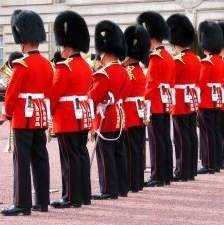BRITAIN COMES BOTTOM
According to a UNICEF report covering (kaweriń, = about) children in 21 developed countries that has just been published (pablyszd, = made public), British kids and young people have a lower sense of (= feeling of) wellbeing (= dobre samopoczucie) than the others do. And that's not all. They suffer more deprivation (deprywejszyn, a deprived
WHY?
Generally speaking, British people don't like being with other people for longer than absolutely necessary. When people come to visit, we put up with (= tolerate) them for a couple of hours or so (= two or three hours) before hinting (hyntyń, to hint = napomknąć) that it's time for them to go. We're also not the most patient people in the world and don't even think about talking to us when we're busy! All of this means that Britain isn't the best place for kids to grow up in. I'm busy! Look, here's a fiver (= a five-pound note). Now, just get out of my way for a while, alright? I think that most Polish parents are more patient with their children and more ready to sit and explain things to them than a lot of British parents are. Then again (= z drugiej strony), being childless (= bezdzietny), it's easy for me to criticise (krytysajz) people.
TALKING IN A PARK
My mum and dad often go to talk to young people in a local park. One or two of them drink a bit and use soft drugs, but they don't do anything really bad. In fact, my parents often have interesting conversations with them. Sometimes police cars deliberately (dylybrytli, = celowo) drive around really slowly near where the young people are, but the police officers never get out and talk to them. How are young people to trust the police if the police don't trust them and don't make time for them? On Christmas Day, my dad started chatting to a group of girls that he knew. They said they were sitting outside to escape (yskejp, = uciekać) from their families. Running away from people after a couple of hours! Very British!
GOOD NEWS!
Polish kids and young people have the healthiest lifestyles of all the countries in the report. For example, obesity (obisyti, = otyłość) is less common (komyn, = powszechny) here than it is in most of the other countries. They also score (= punktować) highly in education: the report's writers feel that this is remarkable (rymarkybyl, = nadzwyczajny) because Poland is quite a lot poorer than the other countries that did well in this category. I don't know about you, but that makes me feel rather proud!
Sources:
'Child Poverty in Perspective: An Overview of Child Well-Being in Rich Countries' (UNICEF report)
'British children: poorer, at greater risk and more insecure' (article in The Guardian)
Dołącz do nas na Facebooku!
Publikujemy najciekawsze artykuły, wydarzenia i konkursy. Jesteśmy tam gdzie nasi czytelnicy!
Kontakt z redakcją
Byłeś świadkiem ważnego zdarzenia? Widziałeś coś interesującego? Zrobiłeś ciekawe zdjęcie lub wideo?
